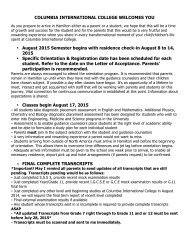french
Create successful ePaper yourself
Turn your PDF publications into a flip-book with our unique Google optimized e-Paper software.
G: Perfect Tenses<br />
You will be learning several new perfect tenses in this level. Review the grammar behind them. This time,<br />
make sure you know all the rules.<br />
The perfect tenses are also called the compound or composed tenses.<br />
The perfect tenses are all composed of a conjugated auxillary verb and a fixed past participle.<br />
Auxillary Verb Formation<br />
The auxillary verb is always either avoir or être.<br />
The tense of the verb depends upon the tense that avoir or être is conjugated in.<br />
When the auxillary verb is conjugated in the passé composé, for example, the auxillary verb is<br />
conjugated in the present indicative.<br />
J'ai fini. - I have finished.<br />
Past Participle Formation<br />
-er verbs - replace -er with é<br />
-ir verbs - replace -ir with i<br />
-re verbs - replace -re with u<br />
irregular verbs - must be memorized<br />
Past Participle Agreement<br />
Audio: French native speaker<br />
The past participle must agree with the direct object of a clause in gender and plurality if the direct<br />
object goes before the verb.<br />
the direct object is masculine singular - no change<br />
J'ai fini le jeu. - I have finished the game.<br />
Je l'ai fini. - I have finished it.<br />
the direct object is feminine singular - add an e to the past participle<br />
J'ai fini la tâche. - I have finished the task.<br />
Je l'ai finie. - I have finished it.<br />
the direct object is masculine plural - add an s to the past participle.<br />
J'ai fini les jeux. - I have finished the games.<br />
Je les ai finis. - I have finished them.<br />
the direct object is feminine plural - add an es to the past participle.<br />
J'ai fini les tâches. - I have finished the tasks.<br />
Je les ai finies. - I have finished them.<br />
Avoir ou Être?<br />
In most circumstances, the auxillary verb is avoir.<br />
However, under certain situations, the auxillary verb is être.<br />
This occurs when:<br />
The verb is one of 16 special verbs that take être.<br />
Note that when a direct object is used with these verbs, the auxillary verb becomes avoir.<br />
The verb is reflexive.<br />
That is, the subject of the verb is also its object.




